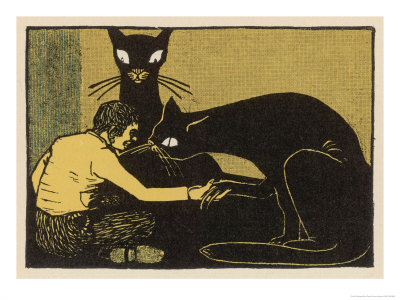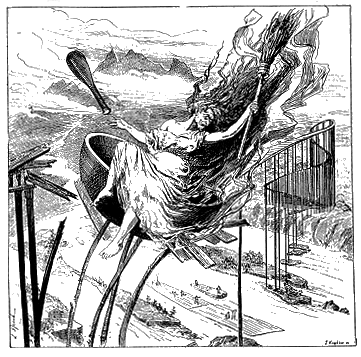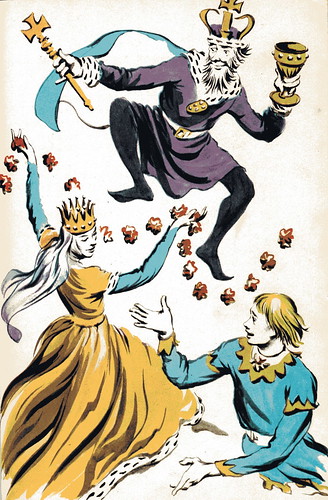This story is from Italo Calvino’s collection, Italian Folktales, and it’s one of my all-time favorites. When kids ask me to tell them a story, this is the one I pull out, and it’s always a big hit. It’s a little gruesome, a little surreal, and it even has a nice, solid moral (which is more than you can say for a lot of fairy tales). Unfortunately for me, I can’t find it anywhere online, so I’m going to transcribe it here just for you. (Thank dog my mom made me take typing in high school.) I hope you like it.
The Tale of the Cats
A woman had a daughter and a stepdaughter, and she treated the stepdaughter like a servant. One day she sent her out to pick chicory. The girl walked and walked, but instead of chicory, she found a cauliflower, a nice big cauliflower. She tugged and tugged, and when the plant finally came up, it left a hole the size of a well in the earth. There was a ladder, and she climbed down it.
She found a house full of cats, all very busy. One of them was doing the wash, another drawing water from a well, another sewing, another cleaning house, another baking bread. The girl took a broom from one cat and helped with the sweeping, from another she took soiled linen and helped with the washing; then she helped draw water from the well, and also helped a cat put loaves of bread into the oven.
At noon, out came a large kitty, the mamma of all the cats, and rang the bell. “Ding-a-ling! Ding-a-ling! Whoever has worked, come and eat! Whoever hasn’t worked, come and look on!”
The cats replied, “Mamma, every one of us worked, but this maiden worked more than we did.”
“Good girl!” said the cat. “Come and eat with us.” The two sat down to the table, the girl in the middle of the cats, and Mamma Cat served her meat, macaroni, and roast chicken; but she offered her children only beans. It made the maiden unhappy, however, to be the only one eating and, noticing the cats were hungry, she shared with them everything Mamma Cat gave her. When they got up, the girl cleared the table, washed the cats’ plates, swept the room, and put everything in order. Then she said to Mamma Cat, “Dear cat, I must now be on my way, or my mother will scold me.”
“One moment, my daughter,” replied the cat. “I want to give you something.” Downstairs was a large storeroom, stacked on one side with silk goods, from dresses to pumps, and on the other side with homemade things like skirts, blouses, aprons, cotton handkerchiefs, and cowhide shoes. “Pick out what you want.”
The poor girl, who was barefooted and dressed in rags, replied, “Give me a homemade dress, a pair of cowhide shoes, and a neckerchief.”
“No,” answered the cat, “you were good to my little ones, and I shall give you a nice present.” She picked out the finest silk gown, a large and delicately worked handkerchief, and a pair of satin slippers. She dressed her and said, “Now when you go out, you will see a few little holes in the wall. Push your fingers into them, and look up.”
When she went out, the girl thrust her fingers into those holes and drew them out ringed with the most beautiful rings you ever saw. She lifted her head, and a star fell on her brow. Then she went home adorned like a bride.
Her stepmother asked, “And who gave you all this finery?”
“Mamma, I met up with some little cats that I helped with their chores, and they gave me a few presents.” She told how it had all come about. Mother could hardly wait to send her own idle daughter out next day, saying to her, “Go, daughter dear, so you, too, will be blessed like your sister.”
“I don’t want to,” she replied, ill-mannered girl that she was. “I don’t feel like walking. It’s cold, and I’m going to stay by the fire.”
But her mother took a stick and drove her out. A good way away the lazy creature found the cauliflower, pulled it up, and went down to the cats’ dwelling. The first one she saw got its tail pulled, the second one its ears, the third one had its whiskers snatched out, the one sewing had its needle unthreaded, the one drawing water had its bucket overturned. In short, she worried the life out of them all morning, and how they did meow!
At noon, out came Mamma Cat with the bell. “Ding-a-ling! Ding-a-ling! Whoever has worked, come and eat! Whoever hasn’t worked, come and look on!”
“Mamma,” said the cats, “we wanted to work, but this girl pulled us by the tail and tormented the life out of us, so we got nothing done!”
“All right,” replied Mamma Cat, “let’s move up to the table.” She offered the girl a barley cake soaked in vinegar, and her little ones macaroni and meat. But throughout the meal the girl filched food from the cats. When they got up from the table, heedless of clearing away the dishes or cleaning up, she said to Mamma Cat, “Give me the stuff you gave my sister.”
So Mamma Cat showed her into the storeroom and asked her what she wanted. “That dress there, the nicest! Those pumps with the highest heels!”
“All right,” replied the cat, “undress and put on these greasy woolen togs and these hobnailed shoes worn down completely at the heels.” She tied a ragged neckerchief around her and dismissed her, saying, “Off with you, and when you go out, stick your fingers in the holes and look up.”
The girl went out, thrust her fingers into the holes, and countless worms wrapped around them. The harder she tried to free her fingers, the tighter the worms gripped them. She looked up, and a blood sausage fell on her face and hung over her mouth, and she had to nibble it constantly so it would get no longer. When she arrived home in that attire, uglier than a witch, her mother was so angry she died. And from eating blood sausage day in and day out, the girl died, too. But the good and industrious stepsister married a handsome youth.
A pair so handsome and happy
We are ever happy to see;
Listen, and more will I tell to thee.






